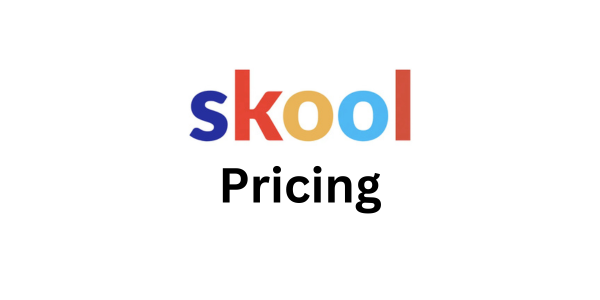Skool has quickly grown into one of the most popular community and learning platforms for coaches, course creators, and online entrepreneurs. Its promise is simple: make it easy to combine a private community, courses, and gamification under one roof.
But how much does it cost in 2026? And are there cheaper alternatives that give you similar features?
In this article, we’ll break down Skool’s pricing, what you actually get with your plan, whether there are hidden costs or transaction fees, and which alternatives might be better depending on your goals.
.png)
Skool Pricing Plans in 2026
Unlike many platforms that offer tiered plans, Skool keeps pricing simple. There’s just one plan.
That’s it. No Starter, Pro, or Enterprise tiers, just one flat price.
What’s Included in Skool’s Plan?
At $99/month, Skool gives you all the essential features to run a community-driven business. Here’s what’s included:
- Community Platform: A private, Facebook-group-style feed where members can post, comment, and engage.
- Course Hosting: Upload and organize your lessons into structured courses.
- Gamification: Members earn points for participation, which encourages engagement.
- Events & Calendar: Schedule group calls, live Q&As, or coaching sessions.
- Simple Payments: Integrated with Stripe for paid communities or courses.
- Mobile App: iOS and Android apps so your members can engage on the go.
- Admin Tools: Moderation, member management, and analytics.
You don’t have to worry about choosing features, you get everything included from day one.
Skool Transaction Fees
Skool doesn’t charge extra transaction fees itself. However, since payments go through Stripe, you’ll pay the standard processing fee:
- 2.9% + $0.30 per sale (in the U.S.)
- Slightly higher depending on country/currency
So, if you sell a $100/month membership:
- Skool takes $0
- Stripe takes about $3.20
- You keep around $96.80
This is much better than platforms that charge high transaction fees apart from payment processing fees.
Skool Free Plan
As of 2026, Skool does not have a free plan.
But they do offer a 14-day free trial so you can test the platform before committing. After your trial, you’ll need to pay $99/month to keep your community active.
Are There Any Hidden Fees?
There are no hidden fees, Skool’s pricing is quite transparent:
- $99/month flat fee
- Stripe processing fees per transaction
- No add-ons, upsells, or “unlock features” traps
The only thing you may pay extra for is if you use third-party tools (like Zoom for live calls, or email marketing platforms if you need advanced email).
.png)
Who is Skool Best For?
Skool is designed for creators and entrepreneurs who want to build both community and courses in one place.
It is best suited if you are:
- A coach or consultant running group programs
- A course creator who wants to add a community to your program
- A membership site owner who thrives on interaction
- Someone tired of Facebook Groups and wants a cleaner, distraction-free alternative
If your training business relies on community engagement, Skool is a great choice.
Downsides of Skool
While Skool is simple and powerful, it does have a few drawbacks:
- No email marketing: You’ll still need ConvertKit, Mailchimp, or another email tool.
- No website builder: Skool is strictly community + courses.
- $99/month flat fee: Affordable for some, but pricey for beginners.
- Limited customization: Skool’s design is sleek but rigid, you can’t fully customize branding like you can on WordPress-based tools.
Cheaper Alternatives to Skool in 2026
Skool is excellent for what it does, but at $99/month, it is not the cheapest option, especially if you’re just starting out. Let’s look at some alternatives.
1. SchoolMaker - Starts at $29/month
- All plans have 0% transaction fees
- Built to drive more course sales
- Provides the best learning experience
- Provides community + course features like Skool
Best for: Course creators who want to drive more sales and get the best student outcomes.
2. Podia - Starts at $33/month
- Combines courses, digital products, memberships, and email marketing
- Base plan has 5% transaction fee
- Includes website builder
Best for: Entrepreneurs who want a cheap all-in-one tool with courses + email + community.
3. Thinkific - Starts at $49/month
- Professional course creation + community experience
- No transaction fees
- Good for course creators who don’t need gamification
Best for: Professional course creators
4. Mighty Networks - Starts at $49/month
- Community platform with courses and memberships
- Starts cheaper than Skool, but advanced features (like branded apps) get expensive
- Strong social features and engagement tools
Best for: Creators who want to build a “mini social network” for their audience.
5. Payhip - Starts for free
- Free plan with 5% fee on sales
- Paid plans from $29/month with 0% fees
- Supports courses, memberships, and digital downloads
- Easy to set up, great for beginners
Best for: Budget-conscious creators who want to test without monthly fees.
Is Skool Worth It in 2026?
The answer is ‘it depends’.
If you are a coach or course creator with paying clients, Skool can be worth the $99/month because its engagement tools and simplicity can help boost your student retention rates and drive more sales.. But if you are a beginner with no revenue yet, $99/month might feel expensice. In that case, start with a free or cheaper alternative then move to Skool later.
If your business model depends on community engagement, Skool is one of the best options available.
.png)
Conclusion
Skool’s pricing in 2026 is as simple as it gets: $99/month, all features included, 0% platform fees. It is not the cheapest, but its simplicity, engagement-driven design, and built-in gamification make it stand out for coaches, course creators, and entrepreneurs who want to build a thriving community.
If budget is a concern, alternatives like SchoolMaker ($29/month) are a good starting point.













